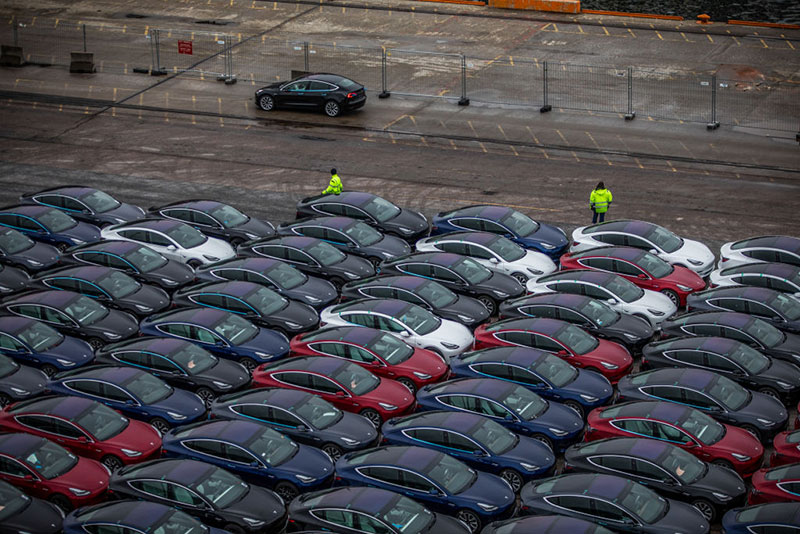电动汽车革命在这个国家已经全面展开
|
在搬去挪威之前,迈克尔·阿勒普从未拥有过汽车。 不过,这位银行家与家人在2016年从丹麦哥本哈根搬到挪威首都奥斯陆之后,觉得有必要买辆汽车。于是,他们做出了和如今的挪威人一样的选择,购买了一辆特斯拉(Tesla)的Model-S。 阿勒普表示,这不是他最初的想法。他说:“我本来觉得(特斯拉)太贵了,不过在挪威购买电动汽车有很多奖励机制。”首先,他在买车时不用交税。此外还能够享受其他福利:不用缴纳交通拥堵费和养路费,还可以免费停车。 这些特权创造了电动汽车的强大需求,推动着这个全球第八大原油出口国走向电动汽车革命的前沿。 |
Until he moved to Norway, Michael Arup had never owned a car. But when the banker and his family moved from Copenhagen, Denmark to the Norwegian capital of Oslo in 2016, they decided a vehicle was a necessity. So they did as the Norwegians now do, and bought a Tesla Model-S. It hadn’t been his first idea, he says. “I had just assumed [a Tesla] would be too costly, but in Norway there are so many incentives to buy electric cars,” Arup says. First of all, he paid no tax when he bought the car. There were other benefits too: no congestion charges, no road tolls—and free parking. Those perks have created a powerful demand for electric cars, pushing the country—the world’s eighth-largest oil exporter—to the front of the electric car revolution. |

|
位于奥斯陆的一家能源咨询公司Rystad的数据显示,今年上半年,挪威电动汽车的销量占私人汽车总销量的55%,较之2013年提高6%。这种改变很大程度上是由于鼓励挪威人采用电动汽车的税收减免和刺激政策的双重强力推动所致。 柴油之死? 这些数据凸显了过去六年里翻天覆地的变化。Rystad表示,在这一时期,柴油车的销量减少了95%,而柴油车的使用比例也下跌至32%,几乎只有2013年的一半。据该咨询公司所说,汽油车的比例也从29%下跌至17%。 Rystad的高级分析师阿尔乔姆·特恩表示:“能够支持高里程的电池电动汽车减少了以SUV和轿车为主的高端柴油车的销量,那些也是市场上消耗能源最多的私家车。” 当然,在挪威最受喜爱的电动汽车品牌一直是特斯拉。根据挪威统计机构的数据,今年7月,这家电动汽车厂商超过大众(Volkswagen),登上了人气榜首位。中型车Model 3则是该品牌销量最好的车型。 阿勒普承认,挪威的特斯拉也有缺点——他表示,在冬天,特斯拉的里程数只有夏天的一半。如果要去滑雪,那么开电动车比开燃油车需要更多准备措施。 不过充电设施的普及也减少了这种忧虑。 他表示:“今年夏天,我们驾车环游了挪威西部,任何地方都能够找到超级充电器。在野营营地,他们也提供超级充电器,还是免费的。” 原油出口国致力于绿色行动 挪威农村的超高速充电站,与该国在经济上对原油和天然气行业的持续依赖似乎有些不一致。 尽管——或者正因为——这种依赖,挪威政府也采取了一些积极措施让消费者放弃化石燃料。在挪威的主权财富基金中剔除一些主要的能源公司,就是采纳了该国中央银行的建议,因为该国太容易受到原油和天然气行业的影响。 |
In the first half of this year, electric vehicles made up 55% of personal vehicle sales in Norway, up from 6% in 2013, according to Rystad, an energy consultancy based in Oslo. That shift is largely due to a powerful mix of tax breaks and incentives to encourage Norwegians to go electric. The death of diesel? Those stats cap a dramatic transformation over the last six years. In the period, sales of diesel cars have dropped by 95%, the consultancy says, and the share of diesel vehicles in use has sunk to just 32%, almost half what it was in 2013. The share of gasoline-burning cars has dropped to 17%, down from 29%, according to Rystad. “High-range battery electric cars have reduced the sales of high-end diesel vehicles, primarily SUVs and sedans, which are also the most energy-consuming private vehicles on the market,” said Artyom Then, a senior analyst at Rystad. The nation’s favorite electric car brand has been, of course, Tesla. In July, the electric carmaker became the most popular in Norway, eclipsing Volkswagen, according to the Norwegian statistics agency. The mid-sized Model 3 was its most-sold vehicle. There are downsides to a Tesla in Norway, admits Arup—in the winter, the range is about half what it is in the summer, he says. Skiing trips require slightly more preparation than if he used a fuel-burning car. But the proliferation of charging infrastructure has also lessened those worries. “This summer, we drove around western Norway, and there were super chargers in the middle of nowhere,” he says. “In the camping site, they had a super-charger, free of charge.” An oil exporter pushes to go green Super-fast electric charging stations in rural Norway is an image that’s slightly at odds with the country’s continued economic dependence on its oil and gas industry. Despite—or because of—this dependency, Norway’s government has also made some aggressive steps to wean consumers from the fossil fuels. That includes aiming to end the sale of fossil-fuel burning cars by 2025, and divesting from some major energy companies within Norway’s sovereign wealth fund—a decision based on the country’s central bank’s advice that the country was too exposed to the oil and gas industry. |

|
Rystad表示,由此导致的消费者对电动汽车的偏好,不仅让柴油车受到严重打击,还减弱了插电式混合动力车的需求。挪威人在选择电动车上倾向于彻底的电动化。 阿勒普对此表示同意。随着电动汽车在挪威普及开来,一些税收激励政策的力度也有所减弱(例如,他如今需要支付一定的拥堵费),不过阿勒普表示,目前享有的优惠比起使用汽油汽车而言仍然更加划算。 他表示,在挪威,“不买辆电动汽车完全没有道理。”(财富中文网) 译者:严匡正 |
Consumers’ resulting shift to electric hasn’t just hit diesel hard, it’s weakened demand for plug-in hybrids too, says Rystad. When Norwegians go electric, they prefer to go all the way. Arup agrees. As electric cars have become ubiquitous in Norway, some of the tax incentives have been cut back (he now has to pay some congestion fees, for example), but Arup says the discounts he gets over fuel-burning cars still mean it's worth it. In Norway, he says, “it doesn’t make sense not to have an electric car.” |













